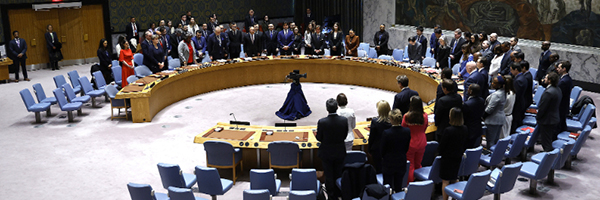The UN Security Council’s formal resolution must not be disregarded by any party
 Global Times editorial, March 27, 2024 —
Global Times editorial, March 27, 2024 —
Since the escalation of the Palestinian-Israeli conflict on October 7 last year, more than 32,000 innocent civilians have lost their lives, with many more displaced. The unfolding humanitarian disaster under the gaze of the international community prompts an increasingly urgent questioning of humanity’s conscience with each passing day. The main reason for the repeated failure to pass a cease-fire resolution was primarily due to the US vetoing it multiple times, depriving the international community of sufficient strength and legitimacy to urge for a cease-fire. This time, the US abstained from voting. Some analysts believe this is the US giving a “green light.” However, in reality, what the US has done is more akin to a “yellow light” – between a “green light” and a “red light,” with Washington’s attitude toward achieving a lasting cease-fire still ambiguous. This sends ambiguous signals to both sides of the Palestinian-Israeli conflict, particularly emboldening Israel to defy the Security Council resolution.
After the resolution was passed, Linda Thomas-Greenfield, US Representative to the UN, claimed the Security Council vote “is non-binding.” Her statement was aimed at appeasing Israel while also laying the groundwork for the US and Israel to reject the resolution, undermining the efforts of the international community over such a long period. This also exposes that the US position on the Palestinian-Israeli issue has not fundamentally changed, failing to lean toward peace forces. However, with increasing demands for an immediate cease-fire both internationally and domestically in the US, under immense public pressure, the US has had to make a gesture. The passage of this resolution can be seen as a victory for the forces of justice in the international community.
The resolutions of the UN Security Council are binding on all countries, which is a clear provision stated in the UN Charter. Even American media believes that UN Security Council resolutions are international law, so it was “not immediately clear” why the US Permanent Representative to the UN “believes it is not binding.” Other members of the UN Security Council, including allies of the US, reiterated that council decisions are binding and mandatory. The US’ ambiguity on this fundamental issue is untenable and cannot be explained away.
If resolutions formally passed by the UN Security Council were indeed as non-binding as the US ambassador claims, the US wouldn’t need to repeatedly veto them. Due to its ambivalent stance on the Palestinian-Israeli conflict, the US has already found itself in a moral and reputational quagmire. If the US dares to disregard UN Security Council resolutions and condone Israel to follow suit, it will inevitably become a target of criticism. We hope that influential countries will play an active role in addressing the situation, including employing all effective means to support the implementation of the resolutions. Among these influential countries, the US should take the lead.
Every day, there is bloodshed in Gaza. The sooner the cease-fire, the sooner the bleeding can stop. The resolution calls for a cease-fire during Ramadan, and now half of Ramadan has passed, causing great anxiety in the international community. Zhang Jun, China’s Permanent Representative to the UN, stated that if fully and effectively implemented, the resolution could still “bring long-awaited hope.” The Permanent Representative of the State of Palestine to the UN stated that this must be a “turning point.” UN Secretary-General Antonio Guterres stated, “This resolution must be implemented. Failure would be unforgivable.” These statements not only express the attitude toward the resolution but also increase the weight of its implementation.
A cease-fire during Ramadan is only the first step in resolving the Palestinian-Israeli conflict. Following this, it is imperative to build upon this foundation toward a lasting cease-fire and ultimately return to the “two-state solution,” which is the only path to resolving the Palestinian-Israeli conflict. The efforts of the international community cannot be undermined, and the US should not repeatedly abstain from voting. It has the capability and, more importantly, the obligation to steer the parties involved back toward the direction aligned with the international community. The primary gain for the international community from the passage of this resolution lies in confidence, as justice will ultimately prevail.
